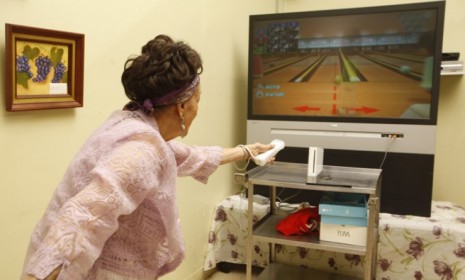Nintendo's worst year ever: 4 theories
The beloved creator of Mario and Yoshi had a terrible 2011, with sales slowing for its signature products. What went wrong?

A free daily email with the biggest news stories of the day – and the best features from TheWeek.com
You are now subscribed
Your newsletter sign-up was successful
This week, Nintendo posted its first ever annual operating loss, saying it had bled $460 million in the 12-month period ending March 31. It's a surprising stumble for the 123-year-old Japanese company, since it was only a short time ago that the video gamemaker was riding high on sales of the Wii, the super-popular console that brought digital bowling and hip-gyrating to living rooms around the world. But in the frenetic world of video games, a lot can change in the blink of an eye. Here, four theories on why Nintendo is struggling:
1. Smartphones and tablets are taking over
Casual gamers have new platforms of choice — namely, the gadgets in their pockets or backpacks — which carves into the target audience for Nintendo's whimsical, family-friendly games. The mobility of new devices has taken "gaming to the bathroom, the commuter bus, and back to the bedroom," says Tim Kelly at Reuters. Nintendo has struggled to compete. Its most recent handheld console, the 3DS, didn't catch fire the way Nintendo expected, and the company was forced to sell the device at a deep discount, which crimped revenue.
The Week
Escape your echo chamber. Get the facts behind the news, plus analysis from multiple perspectives.

Sign up for The Week's Free Newsletters
From our morning news briefing to a weekly Good News Newsletter, get the best of The Week delivered directly to your inbox.
From our morning news briefing to a weekly Good News Newsletter, get the best of The Week delivered directly to your inbox.
2. Microsoft and Sony are slowing sales of the Wii
Microsoft's Xbox Kinect and Sony's Playstation Move, the Wii's motion-sensing competitors, are also eating into the Wii's market share. Nintendo is expecting big things from its new console, the Wii U, which is set for release later this year, but the company will "need a truly explosive launch for the Wii U to realistically return" to profitability, says Kyle Orland at Ars Technica.
3. Nintendo doesn't allow other devices to use its brands
Nintendo games can't be played on non-Nintendo devices, and the "company could no doubt make millions translating big brands like Super Mario, Zelda, and Mario Kart" to the iPhone and Android-operated smartphones, says Keith Stuart at Britain's The Guardian. Known for its fastidious quality control, Nintendo has derided app developers for shabby products, and says leasing its games to other devices would hurt Nintendo's brand in the long run.
A free daily email with the biggest news stories of the day – and the best features from TheWeek.com
4. Nintendo hasn't linked up its own devices
Microsoft and Sony are enabling users to play on several platforms, so that a person can continue the game he's playing in his living room on a handheld device when he leaves the house. But Nintendo keeps its software for different consoles separate, creating another reason for Wii owners to buy a 3DS. The resistance to providing a seamless continuity between products, a trend known as convergence, is typical of Nintendo's stubborn approach, which, in addition to making the user experience less dynamic, "fails to acknowledge the rest of the gaming market and the inescapable shift it's undergoing," says Chris Davies at SlashGear.
Sources: Ars Technica, The Guardian, Reuters, SlashGear
-
 The EU’s war on fast fashion
The EU’s war on fast fashionIn the Spotlight Bloc launches investigation into Shein over sale of weapons and ‘childlike’ sex dolls, alongside efforts to tax e-commerce giants and combat textile waste
-
 How to Get to Heaven from Belfast: a ‘highly entertaining ride’
How to Get to Heaven from Belfast: a ‘highly entertaining ride’The Week Recommends Mystery-comedy from the creator of Derry Girls should be ‘your new binge-watch’
-
 The 8 best TV shows of the 1960s
The 8 best TV shows of the 1960sThe standout shows of this decade take viewers from outer space to the Wild West